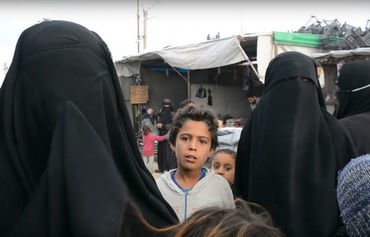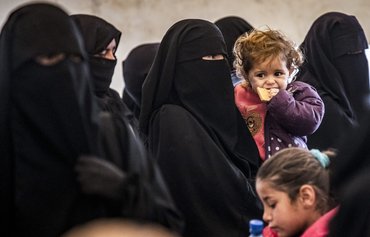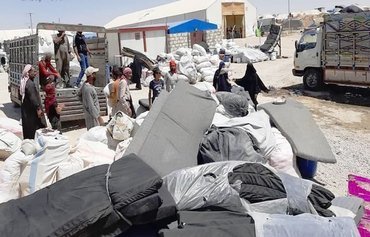The Autonomous Administration in north-eastern Syria on Monday (October 5th) announced it intends to empty al-Hol camp in al-Hasakeh province of Syrian nationals, after receiving guarantees from tribal leaders.
This step will be welcomed by the communities of those being released, Syrian Democratic Forces (SDF) officer Farhad Khoja told Diyaruna.
Syrians constitute the vast majority of the population of the desert camp, which houses tens of thousands of detainees of various nationalities, including families and women with children, Khoja said.
According to the UN Office for the Co-ordination of Humanitarian Affairs (OCHA), al-Hol hosts more than 60,000 people, including 24,300 Syrians either captured or displaced by fighting, AFP reported.
Iraqis make up the bulk of foreigners in al-Hol.
The Autonomous Administration had previously released dozens of families after receiving guarantees from tribal leaders, Khoja said.
The guarantors confirmed the place of residence of all those who are to be released, and pledged that those released under their guarantee would not commit security-related offenses, he said.
"The forthcoming release of Syrians held in the camp will be similar to past releases but will occur more quickly and on a larger scale," he noted.
The administration is still working out what to do about detainees who wish to leave for areas controlled by Tahrir al-Sham and other extremist groups, he said, as these detainees so far have no guarantors.
Khoja said he expects their release to take longer, until an acceptable formula can be reached. He said guarantees are intended to ensure those being released will reject extremist ideology and refrain from contacting extremist elements.
Alleviating pressure in al-Hol
Enabling Syrian nationals to leave al-Hol is expected to alleviate security pressures inside the camp and enhance the provision of humanitarian services to those who remain, Khoja said.
Crowded conditions have created many problems and unrest inside the camp, arising from personal disputes or from instances in which hardline ISIS women have beaten, abused and even killed those who disagree with them.
Khoja said that in his opinion, returning thousands of detainees to their families will have a positive effect, in terms of establishing calm and security in SDF-controlled areas of Deir Ezzor.
He pointed out that some Syrian women were misled by the group's ideology, while others accepted the de facto situation and married or were married to members of the "Islamic State of Iraq and Syria" (ISIS).
Many do not pose significant danger, he said, adding that this move also will curtail the ceaseless escape attempts that mostly fail and put the lives of those who try to escape at risk.
As another consequence of this decision, he said, smugglers who seek to profit from helping people to escape from the camp will lose their source of livelihood.
Clashes between ISIS, regime
Meanwhile, clashes in the Syrian desert (Badiya) between pro-regime forces, backed by Russian airstrikes, and ISIS holdouts have killed at least 90 combatants this month, AFP reported Wednesday.
The clashes broke out in two separate areas of the vast desert that separates the Orontes valley in the west from the Euphrates valley in the east.
On the regime side, 41 combatants were killed, while 49 extremists lost their lives, the Syrian Observatory for Human Rights said.
At least 10 pro-regime fighters and 13 ISIS elements were killed over the past 24 hours alone, Observatory head Rami Abdul Rahman said.
"ISIS is trying to prove that it is still strong," he added.
Mobile ISIS units have remained active in the Syrian desert, since the extremist group lost the last shred of territory it controlled in March last year.
September clashes killed 13 pro-regime fighters and 15 extremists, while in early July 20 pro-regime fighters and 31 extremists were killed over two days.
In August, ISIS claimed an attack, presumably mounted from the desert, that killed a Russian general near Deir Ezzor city.

![In a photo taken August 25th, people walk past tents in al-Hol camp in al-Hasakeh. Thousands of Syrians will be allowed to leave the camp, a top Kurdish official said October 5th. [Delil Souleiman/AFP]](/cnmi_di/images/2020/10/07/26452-Hol-camp-Syria-600_384.jpg)






